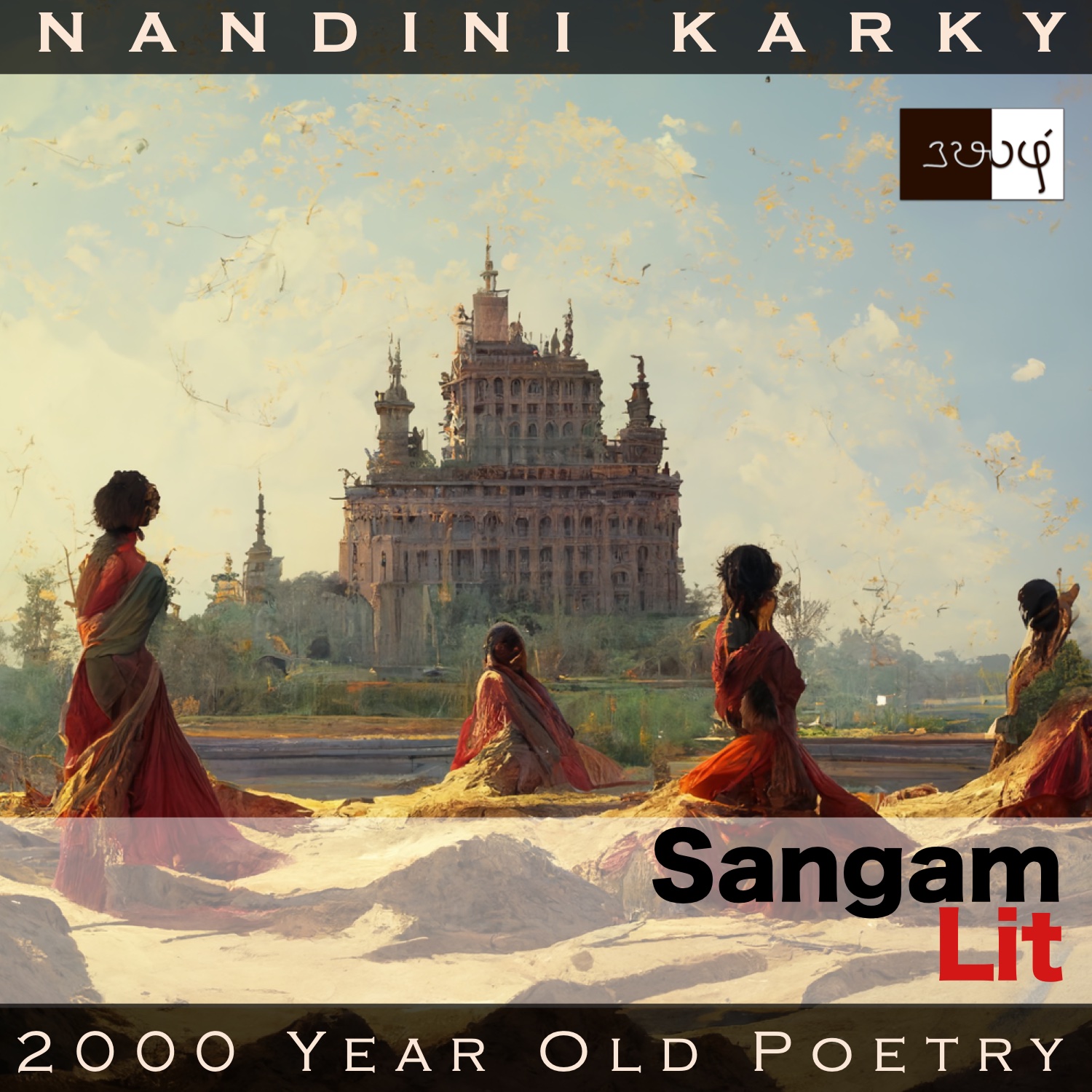Podcast: Play in new window | Download
Subscribe: Apple Podcasts | Spotify | Amazon Music | Android | iHeartRadio | TuneIn | RSS | More
In this episode, we perceive the respect Sangam poets had for their predecessors, as portrayed in Sangam Literary work, Puranaanooru 53, penned about the Chera King Maantharancheral Irumporai by the poet Porunthil Ilankeeranaar. Set in the category of ‘Vaagai Thinai’ or ‘King’s victory’, the verse mentions about the poet’s attempts to capture the essence of the king’s war exploits.

முதிர் வார் இப்பி முத்த வார் மணல்,
கதிர் விடு மணியின் கண் பொரு மாடத்து,
இலங்கு வளை மகளிர் தெற்றி ஆடும்
விளங்கு சீர் விளங்கில் விழுமம் கொன்ற
களம் கொள் யானை, கடு மான், பொறைய!
விரிப்பின் அகலும்; தொகுப்பின் எஞ்சும்;
மம்மர் நெஞ்சத்து எம்மனோர்க்கு ஒருதலை
கைம்முற்றல, நின் புகழே, என்றும்;
ஒளியோர் பிறந்த இம் மலர் தலை உலகத்து
வாழேம் என்றலும் அரிதே ‘தாழாது
செறுத்த செய்யுள் செய் செந் நாவின்,
வெறுத்த கேள்வி, விளங்கு புகழ்க் கபிலன்
இன்று உளன் ஆயின், நன்றுமன்’ என்ற நின்
ஆடு கொள் வரிசைக்கு ஒப்ப,
பாடுவல் மன்னால், பகைவரைக் கடப்பே.
It’s back to the Cheras in this verse celebrating the king’s victory over a Chozha king with the aid of the feudal chief Malaiyan. The poet’s words can be translated as follows:
“Akin to pearls that bloom out of mature oysters, spreads sand in front of the mansion, glowing with the rays of sapphires and dazzling the eyes. Here, maiden who wear radiant bangles dance together in that renowned town of Vilankil. Misfortune surrounded such a town, O Poraiyan, with raiding battle elephants and speedy horses!
If I were to detail it, it would turn out too long, and if I were to abstract it, it would be too short; For people like me with confused minds, it’s rather impossible to sing your praise in its entirety. But we cannot declare that we shan’t live in this land, which holds such illustrious people. As they say, ‘If only the famous Kabilan of immense learning, and one, who has the illustrious tongue to sing profound verses unceasingly, were alive’, I shall try to pen verses that suit those great victories over your enemies, O king!”
Time to delve deeper into these words! The poet starts by bringing in the picturesque image of white sand being spread in front of a luminous mansion. To detail the whiteness of those sands, the poet brings in the simile of pearls gleaming inside very old oysters. Zooming on to the sands of the mansion, the poet mentions how maiden wearing radiant bangles are dancing together. Such is the scene of joy in the illustrious town of Vilankil, the poet elaborates. But that is soon to change in the midst of a war, waged by this Chera king, the owner of furious elephants and powerful horses.
Then, the poet turns inward and reflects on two styles of singing the king’s praises. If he were to choose the path of detailing every single event, then the poem would turn out too long. On the other hand, if the poet were to be concise about it, the poem would be too short and would not have said everything he wanted to say. For people like him in the midst of such confusions, it was too challenging to sing about the king’s praises in entirety. While that may be so, a poet cannot declare, ‘I refuse to live in this land with such illustrious people’. So, taking inspiration from the great Sangam poet Kabilan, renowned all across the land for his deep learning and his ability to pen the richest of verses, with densely packed meanings, who was not alive any more to sing this king’s praises, this poet would try his best to sing a song worthy of this king’s victory over his foes, he concludes.
It’s interesting to note that the phrase ‘those were the times’ is not something exclusive to the modern era. People of every age seemed to have looked at the past and exclaimed this exact same phrase. And in this instance, it’s the verbal prowess of a long-gone poet being celebrated thus. As much as this song is about the victory of this Chera king, it’s also about the skill of this prolific poet. In Sangam Literature, be it Aham or Puram, you cannot traverse the verses without getting to meet the craft of Kabilar. What we have relished through his poems is further strengthened by this reference in a Sangam poem that came after his time. Curious that we know nothing more of many a king but so much more of this poet Kabilar, who was definitely lower in station than the kings and patrons he sung about. History seems to keep playing a game of mystery when it comes to crowning the true hero of an era!




Share your thoughts...